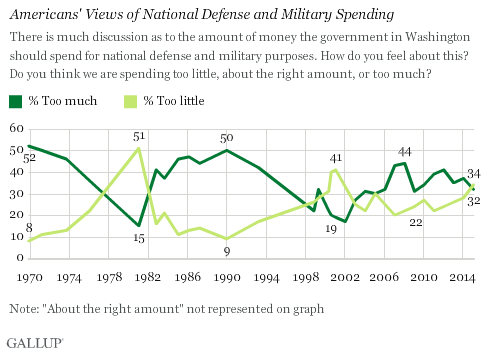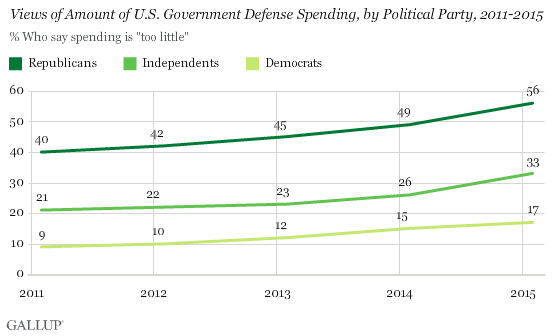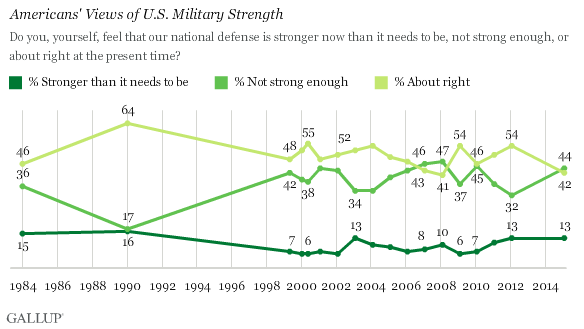Story Highlights
- One in three Americans say U.S. is spending "too little"
- Another third of Americans think U.S. is spending "too much"
- More Americans now say U.S. military is "not strong enough"
WASHINGTON, D.C. -- For the past decade, Americans have been more likely to say the U.S. government spends too much on defense rather than too little, but today, a slim margin separates these views. While the 32% of Americans saying the country is spending too much is about average for recent years, the 34% saying "too little" is the highest since 2001.

These findings from Gallup's Feb. 8-11 World Affairs poll come as both President Barack Obama and congressional Republicans are seeking to increase defense spending amid threats from the Islamic State, but are not in agreement on how to fund the increases. The U.S. has long held the distinction of having the largest military budget of any nation, and the 2014 budget nearly matched the spending of the 10 next-largest national military budgets. Twenty-nine percent of Americans feel the U.S. budget's size is "about right."
The latest figures show the closest margin between "too much" and "too little" in 10 years, and a shift from last year, when there was a nine-percentage-point margin in the direction of "too much" spending. Americans' views on the size of the defense budget have fluctuated greatly over time, but the public has generally been more likely to say the government spends too much. As many as 50% or more shared this view in the Vietnam War era of the late 1960s and early 1970s, as well as in 1990, after the end of the Cold War and a long military buildup under President Ronald Reagan.
There have been a few times in Gallup's 46-year trend when Americans thought there was too little rather than too much spending on defense. These include 2000-2002, spanning the end of the Clinton administration and the 9/11 terrorist attacks, and January 1981 -- just months after the nation elected Reagan, who made U.S. military weakness a major theme of his presidential campaign. Over the course of Reagan's administration, he oversaw a 35% increase in military spending.
All Parties Show Increase in Percentage Saying U.S. Spends "Too Little"
Since 2011, the belief that the U.S. is spending too little on defense has grown within each party group, but more so among Republicans (16 points) and independents (12 points) than Democrats (eight points).

More than half of Republicans (56%) today believe the U.S. is spending too little on the military -- far more than is true among independents (33%) and Democrats (17%). Gallup has historically found this to be the case when it comes to military spending.
More Americans Now Say Military "Not Strong Enough"
A separate question in the poll asked Americans to assess the U.S. military's strength. Forty-four percent say it is "not strong enough," while 42% say it is "about right" and another 13% believe it is "stronger than it needs to be."
Those views have changed significantly from 2012, when Gallup last asked the question. At that time, a much smaller 32% said U.S. national defense was not strong enough, with 54% believing it was about right.

Bottom Line
Having witnessed multipronged international turmoil throughout the past year -- particularly from the Islamic State -- Obama and the GOP-controlled Congress may be able to find some common ground on increases in military spending, which would have the support of a growing number of Americans.
Last month, Gallup found Americans were generally satisfied with U.S. military strength, but their level of satisfaction is down from the past two years and well below where it was after 9/11 and in the early stages of the Iraq war. Combined with the February increase in the percentage saying the U.S. military is not strong enough, public opinion seems to favor increases in defense spending.
Though the White House and congressional Republicans may struggle to agree on how big these increases should be and how they are funded, they can each lean on growing support for an increase within their respective parties.
Survey Methods
Results for this Gallup poll are based on telephone interviews conducted Feb. 8-11, 2015, on the Gallup U.S. Daily survey, with a random sample of 837 adults, aged 18 and older, living in all 50 U.S. states and the District of Columbia. For results based on the total sample of national adults, the margin of sampling error is ±4 percentage points at the 95% confidence level. All reported margins of sampling error include computed design effects for weighting.
Each sample of national adults includes a minimum quota of 50% cellphone respondents and 50% landline respondents, with additional minimum quotas by time zone within region. Landline and cellular telephone numbers are selected using random-digit-dial methods.
Learn more about how Gallup Poll Social Series works.

